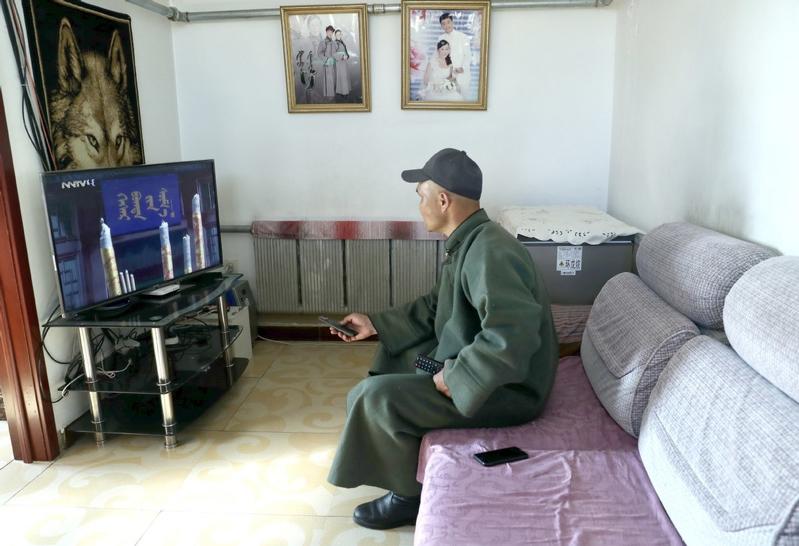 In this undated photo, sheep herder Sonir watches a Mongolian-language television program at home in Xin Barga Left Banner, Inner Mongolia autonomous region, in July 2020. (ZOU HONG / CHINA DAILY)
In this undated photo, sheep herder Sonir watches a Mongolian-language television program at home in Xin Barga Left Banner, Inner Mongolia autonomous region, in July 2020. (ZOU HONG / CHINA DAILY)
Sonir wrestled with dropped calls for years as he herded sheep on grasslands in Inner Mongolia autonomous region, close to the border with Russia and Mongolia.
If there was an emergency, he would race on horseback to higher meadows in search of a better cellphone signal.
But the expansion of internet access now allows him to contact buyers on the WeChat instant-messaging app, watch local and national programs on a smart television and monitor his livestock remotely on his smartphone.
Once I was away for an errand, I watched a cow deliver a calf on my handset.
Sonir, a sheep herder in Xin Barga Left Banner, Inner Monglia autonomous region
Sonir, who has just one name, is one of 30 or so herders who have recently reaped benefits from a program spearheaded by local authorities to boost internet access among the once-isolated herding population in Xin Barga Left Banner.
The banner's government signed a deal with the Inner Mongolia Broadcasting and Television Network, a local internet service provider, in 2018 to build internet infrastructure in remote pastures in a bid to bolster access to basic public services.
ALSO READ: Internet key to rural gains
As part of the program, the company designed a user interface accessible via smart televisions that allows herders to consult doctors and lawyers who are based in the banner seat.
Internet access has also allowed Sonir, 36, to monitor his flock remotely.
Outside his blue-roofed makeshift house is a 5-meter-tall pole with a high-resolution surveillance camera fixed at the top.
Sonir can control the camera's direction remotely by tapping on his smartphone and zoom in to track the whereabouts of the 150 sheep and 30 horses roaming his 200 hectares of grassland.
"Once I was away for an errand, I watched a cow deliver a calf on my handset," he said. "It was smooth, but even if the cow had a difficult delivery, I could have contacted my neighbors for help to prevent financial loss."
The local government said the program will bring wireless internet to 75 percent of Xin Barga Left Banner and ensure that more than 95 percent of herders enjoy internet access.
The expansion of internet access is part of a broader effort by the region to bolster infrastructure in formerly impoverished herding communities.
READ MORE: Internet key to rural vitalization
Sonir was formerly among a small group of herders who have clung to the nomadic lifestyle inherited from their forebears. But many of his peers have chosen to settle down in fixed locations for the most part after shifting to other businesses, such as running small restaurants, supermarkets and homestays that are part of a growing tourism sector.
Those changes have fueled the improvement of their living environment, from makeshift tents in remote pastures to brick-and-mortar houses with home appliances.
For Arslan, a herder from Ewenki Autonomous Banner, his 170-square-meter house equipped with tap water, toilet, gas and heating is a source of pride. The 30-year-old, who married last year, runs a family farm offering an immersive experience for visitors.
"I used to live in a tent when I was younger," he said, adding that the makeshift shelter was vulnerable to the gales and torrents that are common deep in the pastures.
Contact the writers at lilei@chinadaily.com.cn


